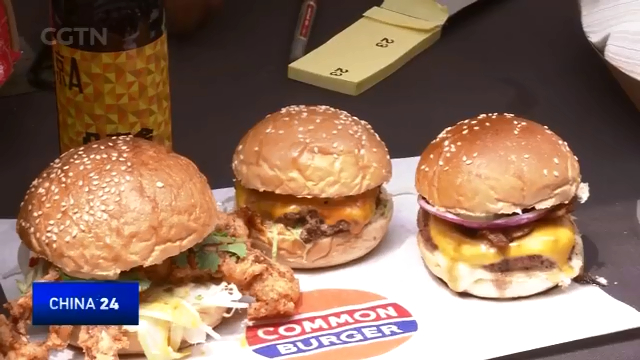
21:05, 16-Jun-2018
US Beef VS Australian Beef: Foodies gather at Beijing Burger Festival to explore diverse options
02:33

China is planning to slap tariffs on US beef. But industry insiders say the move may bring little impact to the food industry in China, as its beef market is diverse and solid. CGTN's Zhao Yunfei reports from the Beijing Burger Festival, where vendors cooked up beef from all over the world, giving foodies more options.
Smoked beef, barbecue sauce, onions, no secret recipe here! And it's also no secret that the burger brings big crowds together, from the east and west.
Home Plate Barbecue is one of very few eateries at the Beijing Burger Festival that offers American beef.
Their marketing manager Chen Zheng says the tenderness of US beef helps them control the food quality, despite the high cost, which is due in large part to China-U.S. trade friction.
CHEN ZHENG MARKETING MANAGER, HOME PLATE BBQ "We have close relations with the US Meat Export Federation. If the tariffs go higher, the federation will negotiate with the American farmer to sell their meat at a lower price."
ZHAO YUNFEI BEIJING "China's new tariffs on U.S. beef come in response to Trump slapping additional duties on Chinese imports. This complicates the market even more. Demand for American beef has grown since China resumed imports of it, following a more than decade-long ban over mad cow disease concerns. But since the ban, Australian beef has become a staple at Chinese restaurants and stores."
Common Burger is one Beijing restaurant that uses Australian beef.
SIMONE THOMPSON FOOD OPERATIONS DIRECTOR, COMMON BURGER "We cook the beef on order, couple of minutes on each side, it's simple if you do it right. We found that using Australian beef can be the most consistent of all."
Consistent in terms of taste from order to order. Thompson says Australian beef is more reliable than American. Vendors are concerned about the source. But for customers, they like having a choice.
"I will pick the place that attracts big crowds. I don't care where their beef comes from, because I can't tell."
"For me, something very important is how original it is. It doesn't matter where it comes from."
Most consumers have flexible tastes. And many say there is no absolute winner in the market. Zhao Yunfei, CGTN, Beijing.

SITEMAP
Copyright © 2018 CGTN. Beijing ICP prepared NO.16065310-3
Copyright © 2018 CGTN. Beijing ICP prepared NO.16065310-3